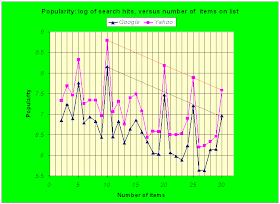Thursday, May 5, 2011
Top ten lists and nice round numbers
Back in December 2009 I blogged about how Almost Nobody Wants to See Your Top 15 List, and said that you should use a Top 10 or Top 20 list instead. In that post I displayed the popularity graph for Top-n lists shown above.
I decided to try the Google Books Ngram Viewer on Top N (and top n) from 5 to 30 at intervals of 5, and got the results shown above. Just like before, lists of 10 are more popular than lists of 20, and lists of 15 are relatively unpopular.
Then I decided to look at Top-N lists with N from 2 to 12 (and Two to Twelve, and two to twelve). The only surprise was how popular a a top two list was.
As I found in 2009, we have a preference for nice round numbers (divisible by ten or five). On May 3rd Wiley Miler had a Non Sequitur cartoon claiming that Moses was responsible for the first Top Ten List.
I got started on using the Ngram Viewer after seeing Bit Lit, an article by Brian Hayes in the May-June 2011 issue of American Scientist. Brian writes their Computing Science column. He did some other analysis on the Google book-scan data, and came up with the graph shown here. He’s described even more on his bit-player web site.






No comments:
Post a Comment